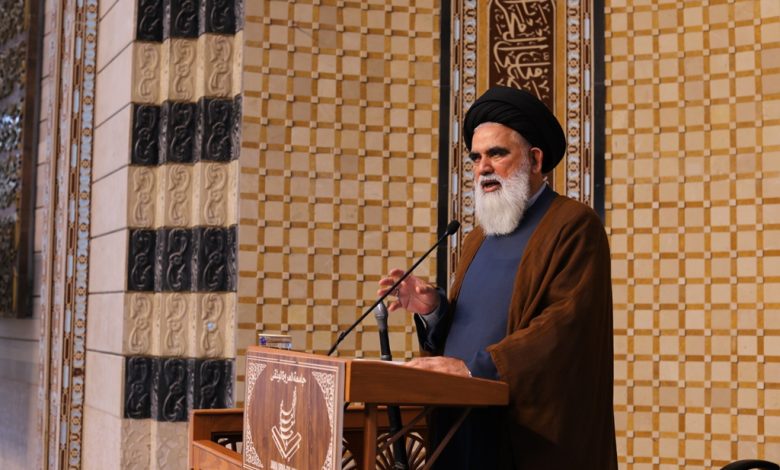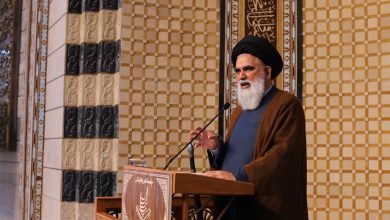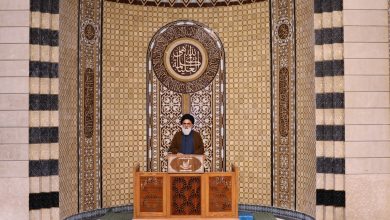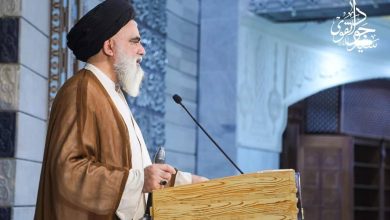
Hujjatul Islam Ustad Syed Jawad Naqvi
(Principal Jamia Orwatul Wuthqa – Lahore)
Delivered at: Masjid Baitul ul Ateeq
Lahore – Pakistan
Friday Sermon 16th May – 2025
Sermon 1: Furqan – an outcome of Tawa; necessity of society
Sermon 2: Gratification of Allah for victory in war should be done practically
Taqwa is not meant for just decoration which means if it is not there then also does not matter. Taqwa is required for a successful life.
In Surah Anfal , verse 25
وَاتَّقُوا فِتْنَةً لَا تُصِيبَنَّ الَّذِينَ ظَلَمُوا مِنْكُمْ خَاصَّةً ۖ وَاعْلَمُوا أَنَّ اللَّهَ شَدِيدُ الْعِقَابِ {25}
And fear an affliction which may not smite those of you in particular who are unjust; and know that Allah is severe in requiting (evil)
The outcome of Taqwa is discussed in verse 29 of Surah Anfal
يَا أَيُّهَا الَّذِينَ آمَنُوا إِن تَتَّقُوا اللَّهَ يَجْعَل لَّكُمْ فُرْقَانًا وَيُكَفِّرْ عَنكُمْ سَيِّئَاتِكُمْ وَيَغْفِرْ لَكُمْ ۗ وَاللَّهُ ذُو الْفَضْلِ الْعَظِيمِ
“O you who have believed, if you possess Taqwa of Allah, He will grant you a criterion and will remove from you your misdeeds and forgive you. And Allah is the possessor of great bounty
Many people claim to be believers, yet in reality, they are not. The addressees here are those whom the Quran considers true believers. The Quran states that if you adopt Taqwa (piety and protective consciousness), then Allah will grant you Furqan. The second consequence of Taqwa is that Allah will conceal your sins and, beyond that, grant you forgiveness. And these rewards are not limited to just these—Allah is the possessor of immense bounties, which will also be bestowed upon you.
The first outcome of Taqwa mentioned here is Furqan, a significant concept and one of the titles of the Quran itself. Furqan, meaning “criterion,” is not synonymous with general knowledge. Elsewhere, the outcome of Taqwa is described as knowledge, but Furqan originates from the Arabic root word “Farq,” which means separation or distinction. In Arabic, “Farq” also refers to the line created when hair is parted on the head. In Arabic literature, any tool or method used to separate or distinguish two things—whether they are mixed or one entity that needs division—is called “Farq.” For example, the people of Medina used a tool named Farq to separate grains from water. Hence, Furqan refers to the means through which this separation is made.
Surah 25 of the Quran is titled “Al-Furqan,” highlighting its role in providing divine awareness that enables one to differentiate between truth and falsehood. Many of our challenges today arise from a lack of such awareness. While we may be conscious of our personal interests and desires, Furqan is a specific divine awareness granted by Allah to believers that allows them to discern correctly. This discernment is vital in both our personal and religious lives.
When people visit a marketplace, they may see the same products, yet some can distinguish quality based on their experience or knowledge, while others, lacking this ability, trust the shopkeeper blindly and fail to identify even fresh vegetables—often leading to scolding from their spouses. In contrast, those with insight inspect carefully and choose wisely. This intellectual ability to differentiate between good and bad is Furqan. In English, it is translated as “Criterion” or “Standard.” Seeing everything as the same stems from a lack of insight, which leads people to treat the paths of guidance and misguidance as identical.
Abdullah ibn Masood narrated that one day the Prophet (s) gathered his senior companions in a circle and drew three parallel lines. He explained that the center line represents his path—the path of truth and righteousness—while the two parallel lines beside it represent the deceptive paths of Shaytan. The wisdom here is that false paths often run parallel to the true path and resemble it. Without Furqan—the ability to distinguish—one may consider all paths alike. This is the tragedy of our time: talents and skills have developed, but the capacity to discern right from wrong is lacking. Today’s generation cannot differentiate even between things that are visibly distinct, treating them as the same.
The Quran asks: are those who know and those who do not the same? Are believers and transgressors equal? The Quran raises these questions because people tend to see them as the same. Many say we should treat everyone equally and leave judgment to Allah—after all, they are all Muslims from the same family or tribe. But the Quran has established distinctions, and we have blurred them. The foundation of life in many societies is cultural—not spiritual—and that culture emphasizes kinship over belief. It prevents separating between relatives based on faith or morality. Just look at your own friends: how many are believers and how many are transgressors? The Quran insists that you must not equate a believer with a transgressor.
Another flawed foundation of our society is democracy, which treats every citizen—regardless of faith or righteousness—as equal, particularly in voting. We also fail to differentiate between oppressors and the oppressed. Recently, the guardians of the Kaaba honored and bowed before an oppressor who visited, without distinguishing between the tyrant and the victim. Globally too, we see this inability to tell them apart.
Where does Furqan come from? In our society, the need for Furqan isn’t even acknowledged. People of certain sects admire every scholar of their group, regardless of whether that scholar is corrupt, manipulative, spreading sectarianism, or distorting religion. Without Furqan, we lack the criterion to distinguish good from evil. The Quran uses the word Furqan to describe separation between truth and falsehood, but in broader literature, it applies to any form of discernment. Without this ability, one cannot distinguish between Ahlulbayt and Banu Umayyah, or between divine guides and corrupt leaders.
Do we honor scholars based on the standards set by the Quran, or by cultural and political biases? If you were to categorize the most corrupt individuals in Pakistan, politicians would top the list. Yet people vote for them and give them leadership roles. Furqan is the power of discrimination that stems from Taqwa.
Verse 29 of Surah Anfal declares that if believers acquire Taqwa, Allah will grant them Furqan—the ability to distinguish. You may see highly intelligent scholars who, despite their knowledge, fail to distinguish truth from falsehood in contemporary issues because their actions are driven by personal interests.
Imam Ali (a) advised, “Do not treat me like those who praise only to please and condemn only to displease.” It is possible that someone praises but does so out of ulterior motives; such a person should not be appeased simply because he offers compliments. Similarly, one should not criticize someone just because they withhold praise or benefits. This balanced perspective comes with Furqan, which in turn comes from Taqwa.
Social media is unreliable—even 1% of its content cannot be trusted. It will not grant you Furqan. During the recent India-Pakistan conflict, not a single accurate point was presented. Media is designed not to reveal truth, but to propagate misguidance.
Taqwa gives rise to Furqan. Taqwa does not merely mean fearing Allah; it means living a protected life. You’ll find many seemingly pious individuals who still lack Furqan. They are unsure of where to go, whom to associate with, or what to say. That is not real Taqwa. True Taqwa is a protective mechanism that, when properly practiced, gives birth to Furqan—a cultivated inner ability to discern.
Modern lifestyles destroy this ability to differentiate, suppressing our higher faculties. Just as many physical illnesses are caused by lifestyle, mental and emotional disorders—like anger and impatience—are also born from it. To protect ourselves from this spiritual and mental decay, we must adopt a lifestyle of Taqwa—a life where no action or relationship is formed that harms one’s soul.
Today, our bodies are sick, our souls are sick, and society is sick—a sickness within sickness. How can we expect peace in such a condition? A sick soul, a sick body, and a sick society cannot offer tranquility. Allah’s natural system for human well-being is Taqwa. If you live by it, you will be safe, and your inner and outer ailments will begin to heal.
Sadly, instead of embracing Taqwa, we seek peace in entertainment, dining, and social gatherings. But a secure life—rooted in Taqwa—leads to a secure mind, which leads to Furqan.
This is the greatest loss of our era: we have lost the ability to discriminate in all areas of life, yet we still hope for the highest ranks in Jannah. If Jannah is a place for those with psychological instability or unchecked desires, then perhaps that hope is valid. But if Jannah is the result of nearness to Allah and righteous deeds, then we must realign our lifestyle with Taqwa.
The best life is the life of Taqwa. Its fruits are reaped both in this world and the hereafter. Among these is Furqan, followed by the concealment of sins by Allah, and ultimately, His forgiveness. Through Taqwa, sins are initially concealed, and with forgiveness, they are completely wiped away.
SERMON 2
Today, Taqwa (God-consciousness) is absent, and the condition of the Muslim Ummah is in its most grievous state. For the sake of protection, Muslims are seeking refuge in Taghoots (false powers). When rulers, politicians, leaders, and scholars abandon Taqwa, the people follow suit, resulting in widespread insecurity. In this state of fear, people begin to seek protection from other predators—attempting to save themselves from one beast by turning to another. This describes the tragic condition of Muslims today.
Despite internal challenges, Allah (swt) has protected Pakistan from an attack, and the government has declared May 16, 2025, as a day of gratitude. This gratitude is indeed warranted, as Allah has preserved the dignity of Pakistan amidst its many internal issues. The armed forces became the means through which this monstrous threat was countered and Pakistan’s honor was safeguarded.
The recent battle, which has now led to a ceasefire reportedly lasting until May 18, is not the end. The butcher Modi is said to be preparing for further aggression against Pakistan. Presently, the world’s political geography is being reshaped, and a new global map is being drawn. After World War I, the Ottoman Empire—a Muslim stronghold—was dismantled, and a new Middle East was created, paving the way for the establishment of Israel. The Arab tribes were granted fragmented territories in exchange for supporting Israel. These Arab regimes, while betraying Islam, remain loyal to the forces of evil.
This new world map has endured for some time, but global powers now seek to revise it. Certain governments, rulers, and groups—deemed undesirable—must be eliminated as part of this agenda. They aim to demolish existing systems and lay the foundation for a new world order by taking control of key regions and destroying others. In this plan, America, Zionists, and Europe play the role of aggressors, while the Arabs and Turks serve as traitors.
West Asia is now also embroiled in this reconfiguration, and Pakistan is a target. Pakistan is seen as an anomaly—a state that should not exist in its current form. The aim is to “reset” Pakistan, and India is being transformed into a regional Israel. Just as Israel emerged as a monstrous force against the Arabs, India is being positioned to become a monstrous force against Pakistan.
Everyone must understand that India is no longer just a neighboring country. It has employed all means to weaken Pakistan, and when it perceived Pakistan to be vulnerable, it launched an attack. This perception of weakness was a misunderstanding, but it stemmed from internal signals sent by Pakistan’s own rulers, politicians, generals, judges, and power-hungry individuals—both religious and secular. They portrayed a broken economy, sectarian conflict, and moral corruption as signs of collapse, essentially signaling to India that Pakistan was ready to fall.
The most significant signal was the narrative that Pakistan’s army had been weakened. While I am a vocal critic of the military’s involvement in politics, the army remains the primary defense force of the nation, and defending Pakistan is its duty. This false impression that the military is dysfunctional and merely political has been corrected. For years, political discourse sought to weaken the military.
The previous Prime Minister claimed that terrorists entering from Afghanistan could not be countered because the police lacked the weaponry, and even the military lacked sufficient funding due to economic collapse. These statements sent a clear message to India: Pakistan could not fight terrorism and was thus weak. India, with a military of 3 million personnel, state-of-the-art weapons, and an $80 billion budget, saw this as an opportunity to strike a country with a mere $9 billion defense budget.
Our current Prime Minister repeatedly appeals to the Taliban not to send terrorists into Pakistan, yet receives no response. This “pragmatic” policy has projected weakness externally. When India annexed Kashmir, Pakistan continued to say it desired peace with all. Such diplomatic statements became justifications for aggression. India attacked Pakistan with the arrogance of fighting its first war, emulating Israel’s tactics: air raids and drone strikes designed to instill fear.
But Allah (swt) protected this nation—from both internal traitors and external aggressors—and our forces responded so powerfully that India was compelled to agree to a ceasefire. On this Day of Gratitude, we must express our thanks to Allah—not just verbally, but through action. Real gratitude lies in abandoning weak diplomatic rhetoric that sends the wrong signals. True gratitude means adopting the path of resistance, fighting back, and uprooting enemies.
We must learn from the Palestinians, Iranians, and Imam Hussain (a)—who all demonstrated that submission to oppressors is not an option. When Pakistan abandoned a path of disgrace, Allah honored it. If we choose dishonor, India and the Taliban will continue to humiliate us.
Before India fully becomes another Israel, as Imam Khomeini (r.a) warned, we must adopt his strategy to dismantle it. This strategy must be followed by Pakistan’s people, military, leaders, and scholars. India must be treated as a hostile aggressor. Before they strike again, they must be dealt with on their own soil. Allah has already shown that if we rise with faith, He will be with us—and it is His promise that small, devoted groups can overcome mighty enemies.
Pakistan must also reevaluate its policy on Palestine. Saying “this war is not ours” has failed. We did not go to Israel, but Israel has now come to fight us—through India. This was their strategy. Azerbaijan and Turkey, although hailed as friends of Pakistan, betrayed the Palestinians during the Gaza war and are now positioning themselves as Pakistan’s allies. Analyze Turkey’s close ties with India and its calculated alliances. These are not true friends—they are aligned with your enemies to weaken you from within.
Therefore, we must be vigilant. If Pakistan chooses the path of resistance, it must build strategic relationships not with Turkey or Azerbaijan, but with true resistance movements like Hamas, Hezbollah, and the Yemeni forces. Yemen can offer more meaningful support than Turkey or Azerbaijan.
This honor Allah has granted Pakistan should be met with real gratitude. That means ending internal differences, showing unity on the ground—not just in speeches. Practical unity is the only assurance of Pakistan’s survival. We pray to Allah to protect this country from every threat and danger.





This piece exudes a sense of calm certainty — the kind of writing that makes you feel grounded and at ease.